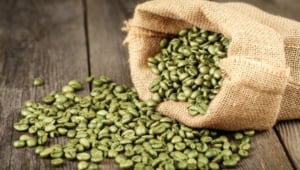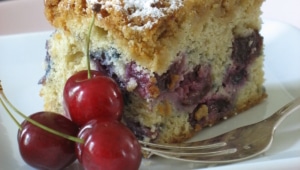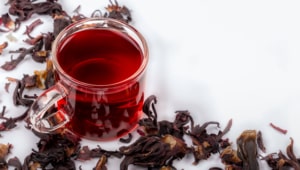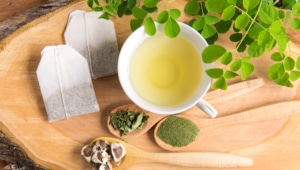Alternatives to Coffee: 8 Best Healthy Substitutes + 6 Coffee Types

With 491 million cups of coffee consumed on a daily basis in the United States alone, coffee is the most consumed beverage for Americans. Sometimes, however, you may find that coffee isn’t exactly what you’re looking for to start your morning. Find here the best alternatives to coffee and healthy coffee substitutes.
You may be used to your everyday cup of joe, but it’s not always the healthiest option; to some people, the drink is certainly an acquired taste. If you’re in either one of these camps, why not try a coffee substitute or a different type of coffee altogether?
Don’t worry – we’ve prepared our list of healthy substitutes and different types of coffee to help you choose a morning brew that you’ll love and that will be equally great for your body.
Once you’re done browsing through this guide, you’ll have a better understanding of not just coffee but also other great alternatives you can try.
You’ll also hopefully have a more informed perspective on whether you’d want to keep this morning brew or go for something else entirely. So without further ado, let’s get into it.
Effects of Coffee on your Body

Effects of Coffee on your Body
Coffee isn’t popular just for its taste – there are plenty of other reasons why people choose to drink it, one of which is the drink’s caffeine boost for the day ahead.
Having some caffeine in the morning certainly helps you stay alert, but there’s more to this beverage than meets the senses. Let’s explore all the major effects that coffee has on your body.
Here you will learn more about green coffee.
Increased Alertness
Because of its caffeine content, coffee is often consumed to help keep the drinker stay awake while also providing them with a little jumpstart for their day.
The drink has been proven to improve the drinker’s attentiveness and reaction time and is especially useful if you’re trying to fight off sleep inertia. By drinking coffee, you’re more able to do mental and physical tasks without wanting to go back to bed.
Increased Heart Rate and Blood Pressure
If you’ve consumed enough caffeine, you may experience a spike in your heart rate and blood pressure. It’s a short-term effect that only occurs for up to three hours after drinking coffee, and it mostly occurs in people who don’t drink coffee regularly. In the long term, however, regularly drinking coffee can actually reduce your risk of heart disease by 15 percent.
Increased Ability to Concentrate

Increased Ability to Concentrate
If you drink a cup of coffee before heading off to work or to study, you may find that it helps you concentrate on your physical and mental tasks.
If you have issues with fatigue or just had a long night, coffee allows you to stay active and hones your focus on important tasks. Of course, this is just a temporary fix as you should always try to rest up and strive for high-quality sleep.
Improved Physical Performance
Your improved performance isn’t limited to your mental functions, though. Thanks to caffeine, coffee can also help your short-term physical performance. Not only does caffeine give the body more energy to do more physical tasks, but it’s also been suggested that caffeine improves muscle performance.
If you’re working out, this might mean being able to do a couple of extra push-ups to achieve your fitness goals.
Increased Metabolism
Caffeine increases your resting metabolic rate (RMR) by three to eleven percent. RMR refers to the rate at which a body burns calories while at rest. With a higher RMR, it’s much easier to lose weight and keep that weight off.
It’s worth noting, however, that the effect of caffeine on RMR varies from person to person and is less pronounced in heavier and older people.
Health Benefits of Coffee

Health Benefits of Coffee
Despite having its risks, coffee isn’t inherently bad for you. As long as you’re not sensitive to caffeine and you’re consuming it in low or moderate doses, coffee actually has a number of long-term health benefits for you to enjoy. Read on and discover what the upsides of drinking coffee for you are.
For example, people with diabetes can benefit from coffee, as can athletes. In addition, the drink improves the ability to concentrate and makes you awake.
May Help Reduce the Risk of Type 2 Diabetes
Long-term studies have shown that frequent coffee drinkers have a lower risk of developing type 2 diabetes when compared to non-coffee drinkers.
Coffee contains not only caffeine but also minerals like magnesium and some polyphenols (beneficial plant compounds). These compounds are thought to improve the effectiveness of insulin and increase one’s metabolism, thus lowering the risk of type 2 diabetes.
May Help Reduce the Risk of Liver Disease
Coffee is also theorized to help reduce the risk of liver disease. Studies show that regularly drinking coffee prevents liver cancer and other liver conditions such as fibrosis and cirrhosis.
Regular coffee consumption has also been shown to correspond to a slower progression of liver diseases, including hepatitis C.
Can Improve Cognitive Function

Can Improve Cognitive Function
As mentioned earlier, coffee boosts your immediate alertness and ability to concentrate and therefore improves your short-term cognitive function.
However, the benefits don’t stop there – coffee can also promote the long-term health of your brain. Caffeine has been shown to support dopamine production and helps prevent the development of Parkinson’s disease.
Can Improve Athletic Performance
Because of the energy boost it offers, coffee improves and prolongs athletic performances. Aside from the extra energy, the drink also hones one’s focus and lowers any fatigue (and even pain) that a person may experience.
What this means is that you’ll be able to do more in your workout without putting too much stress on your body.
Contains Antioxidants
Coffee is one of the most antioxidant-rich beverages you can drink with a total antioxidant content of 200–550 milligram per cup. Antioxidants are powerful compounds that minimize the effect of free radicals that cause aging and diseases. A cup of coffee every day, therefore, helps keep you healthy and reduce aging in the body.
Risks of Coffee

Risks of Coffee
There are plenty of health benefits that your cup of coffee offers, but coffee isn’t without its health risks. There are also plenty of reasons why you might not want to have a cup of joe in the morning, especially if you happen to be more sensitive to caffeine. Apart from that, there are several other downsides to drinking coffee.
Be especially careful with coffee if you suffer from insomnia or anxiety.
May Cause Insomnia or Disrupted Sleep
Coffee is great for waking you up, but that becomes an issue when you’re trying to sleep. Caffeine is notorious not only for making it difficult to fall asleep but also for negatively affecting the quality of your sleep.
While it doesn’t directly cause insomnia, consuming caffeine to counter fatigue caused by sleep deprivation will worsen the disorder’s symptoms.
Can Increase Heart Rate and Blood Pressure
As mentioned, increasing your heart rate and blood pressure are some of caffeine’s short-term effects on the body. Despite being temporary, however, elevated blood pressure will nonetheless still increase your risk of cardiovascular issues like stroke or heart attack.
Because of coffee’s effects, we recommend that you avoid consuming large amounts of caffeine if you already have high blood pressure.
Heartburn and Upset Stomach

Heartburn and Upset Stomach
Caffeine also has the potential to trigger heartburn and upset stomachs in some people, particularly those who have issues with acid reflux. In your cup of joe, caffeine isn’t the only offender, however.
The drink itself is acidic and encourages the production of stomach acids, thus causing heartburn and upset stomachs. Other additives to coffee, like cream and sugar, may also cause these unpleasant effects – so consider trying a lactose-free creamer or cutting out these additives altogether.
May Worsen Anxiety Symptoms
If you have an anxiety disorder, you’re probably familiar with coffee’s tendency to worsen your symptoms. Even if you don’t have anxiety, you may experience a heightened sense of nervousness due to an excess of caffeine.
Caffeine’s effects, such as an increased heart rate and trouble sleeping, mimic many symptoms of anxiety and make it difficult for your brain to differentiate the drug from an actual anxiety attack.
Addiction Can Lead To Caffeine Dependence

Addiction Can Lead To Caffeine Dependence
By relying on coffee to get you out of sleep inertia and make you alert every morning, you risk developing a dependence on caffeine. As a stimulant, caffeine is addictive.
In the long run, a person may find it increasingly challenging to stop drinking coffee, consume more of the drink because of caffeine tolerance, and experience caffeine-dependence symptoms such as headaches when they try to reduce their coffee intake.
Stains Teeth
The tannins in coffee, which are responsible for its classic bitter taste, also stain your teeth yellow. These tannins seep through the pores in your enamel and eventually discolor your white teeth. Further, coffee’s acidic nature wears down your enamel over time, leaving it more susceptible to staining.
Dehydration
Too much coffee causes dehydration. Because caffeine is a diuretic, it encourages the production of urine – thereby affecting the body’s hydration levels. Hence, overconsumption of caffeine will leave you slightly dehydrated, although it’s important to note that this is a minor effect that only occurs if you drink more than five cups of coffee in a single day.
Jitters
Coffee jitters are a common effect when someone has consumed too much caffeine, especially if they don’t drink coffee often and don’t have a caffeine tolerance. If you experience shaking and sweating after drinking coffee, you’re likely experiencing coffee jitters. Note that this effect goes hand in hand with any heightened nervousness and agitation you may already be experiencing.
Best Healthy Coffee Substitutes
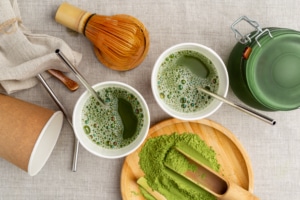
Best Healthy Coffee Substitutes: for Example Matcha
If you’re after a healthy drink for a good start to your day or want to try something different the next time you’re at a coffee shop, here are some tasty coffee substitutes to consider.
Some of these substitutes have caffeine for a bit of extra energy, but we’ve also listed caffeine-free options if you’re looking to avoid the stimulant. As always, it’s best to consume any of these drinks in moderation.
Alternatives with Caffeine for Energy
For those who want a kick to wake them up in the morning or a pick-me-up to consume throughout the day, these coffee alternatives will give them that much-needed extra boost.
As a word of caution, be aware that these caffeinated drinks also come with the same caffeine-related risks. While these beverages won’t taste like coffee, their effects will still resemble that of coffee.
Green Tea
Green tea is a popular coffee alternative to enjoy in the morning for a relaxing start to the day. It’s a great option if you’re looking for something with less caffeine as it contains 20 to 45 milligram per 8 ounce cup compared to the average 95 mg in a cup of coffee. Green tea is also abundant in antioxidants, so if you’re after the antioxidant boost of coffee with less caffeine, it’s a great choice.
Yerba Mate Tea
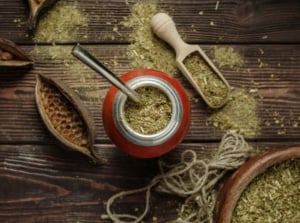
Yerba Mate Tea
Originating from South America, yerba mate tea is an antioxidant-rich beverage. It has a strong herbal taste that might take some time to get used to but also has a similar amount of caffeine as coffee – making it an excellent alternative if you want the same energy boost with a different taste.
Do take note though that yerba mate is not for everyone, and while it’s safe and healthy to drink occasionally, it can increase your risk of certain cancers if consumed too frequently.
Black Tea
Black tea leaves come from the same plant as green tea. However, these leaves have been oxidized longer, resulting in a stronger, slightly bitter taste that you can enjoy by itself or with milk and sweeteners. Like green tea, it’s also packed with antioxidants, but it tends to contain more caffeine with values hovering around 47 milligram per 8 ounce cup.
Matcha Green Tea
Matcha green tea is known for its bitter, earthy taste and offers a healthy caffeine boost. Traditionally, this drink is prepared by whisking matcha powder with hot water, but many people nowadays also enjoy it in the form of a matcha latte. To make a matcha latte, just mix the powder with hot milk and water. You can enjoy the drink either hot or iced.
Kombucha
For a fizzy pick-me-up during the day, try kombucha. This fermented tea drink has been gaining popularity in recent years as it comes in many different flavors and contains good bacteria with probiotic benefits.
While there is caffeine in kombucha (since it’s made from tea), the levels are significantly lower at around 10 to 15 milligram per 8 ounce cup. Hence, you can have a sip of kombucha later in the day with minimal risk that it’ll affect your sleep.
Coffee Alternatives without Caffeine

Coffee Alternatives without Caffeine
For something without a buzz, these caffeine-free alternatives are perfect for a healthy start to the day. And because these drinks are tasty without leaving you staring wide-eyed at the ceiling, they’re also excellent options for relaxing before heading to bed.
As an added bonus, any one of these options also poses an excellent taste experience. Try for example golden milk latte or some herbal teas.
Golden Milk Lattes
Colored bright yellow by turmeric, golden milk lattes are a trendy and delicious drink that’s warm, aromatic, and fantastic for your health.
The drink is made with spices such as ginger, turmeric, and cinnamon, giving it a bitter taste with a slightly spicy kick and packing it with anti-inflammatory qualities. These benefits make the drink an especially great alternative for people who experience upset stomachs due to coffee.
Cacao Lattes
For another milky alternative, try a cacao latte. Pre-processed cacao is an antioxidant-rich superfood that’s rich in magnesium, iron, and calcium. Just add some raw cacao powder and sweetener to some warm milk to enjoy a tasty, healthy version of chocolate milk.
Herbal Teas
If coffee makes you jittery and anxious or keeps you from falling asleep, try drinking herbal teas instead. These drinks come in all sorts of flavors and will cater to different palates, whether you’re after something minty, fruity, or floral.
Teas such as chamomile or sleepy-time blends are especially great if you’re looking for a hot drink to sip before bed.
Types of Coffee with and without Caffeine

Types of Coffee with and without Caffeine
If you enjoy coffee and don’t think you can give it up, here’s a list of different types of coffee to add a bit of variety to your morning brew. Some of these coffees have caffeine naturally, but you can always choose a decaffeinated coffee for a caffeine-free drink.
Espresso
Espressos are simply a shot of rich, strong brew made from darkly roasted coffee beans. The coffee beans are finely ground, finely packed, and are usually brewed in an espresso machine. This approach ensures that the coffee has a deep, toasted flavor that will fuel you for the day ahead.
Americano
If you like the bitterness of espresso but want something that tastes a little less strong, try an americano. Americanos are essentially a shot of espresso that has been diluted with some water, giving it a smoother and less acidic taste.
For the more creative drinkers, americano provides an excellent canvas for adding other flavors and elevating the entire coffee-drinking experience.
Latte
If you’re after something less bitter, try a latte. These drinks originated from America and add a twist to the typical shot of espresso by adding steamed milk, making it smoother and less bitter. Milk makes up about two-thirds of the drink, hence its name, which means “milk” in Italian.
Cappuccino
Like lattes, cappuccinos are also a milky drink. The difference here, however, is the ratio – cappuccinos have equal parts of coffee, steamed milk, and milk foam, making it an appealing choice for fans of frothed milk. Because of the ratio of these ingredients, cappuccinos are balanced drinks that test a barista’s abilities.
Mocha
For a sweeter treat, go for a mocha, a beverage made from the heavenly combination of coffee and chocolate. Similar to a latte, mochas are made with coffee and steamed milk while also including either chocolate syrup or powder – perfect if you have a sweet tooth. The end result is a luxurious drink that masks coffee’s bitterness in favor of an endearing caffeine experience.
Mushroom Coffee
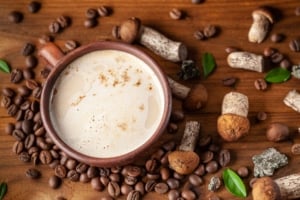
Mushroom Coffee
For something less orthodox, try a cup of mushroom coffee. Mushrooms have been used throughout history for their medicinal properties, and mushroom coffee attempts to take advantage of these benefits by putting them in your morning brew.
Taste-wise, mushroom coffee is very similar to regular coffee as the main difference is in the coffee blend that includes ground mushrooms (popular options include turkey tails and reishi). These mushrooms leave you with positive effects such as improved immunity and potential cancer prevention.
